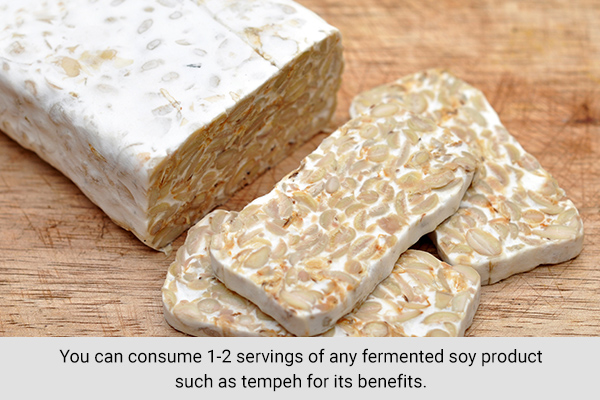In this article:
You might have heard of soy and its products affecting hormones, but what about fermented soy?

Soy contains isoflavones, and even fermented soy products can affect hormones. Soy isoflavones act as a phytoestrogen, which imitates natural estrogen (in women) and has a weak estrogenic effect. (1)
It can reduce levels of FSH and LH, which are both involved in stimulating and increasing the growth of follicles as well as normal ovulation. (2)
How Does Soy Affect Hormones in Women
Fermented soy products are widely used in Asian cooking. Soybean paste or soybean milk is fermented to increase the number of beneficial bacteria, and some of the resulting products include Japanese natto, tempeh, knema, gochujang, soy sauce, and pepok. (3)
Soy (fermented or unfermented) contains two major isoflavones, genistein and daidzein, which bind to the estrogen receptor in the body, and depending on the hormonal level of the body, they can cause a weak estrogenic effect or nonestrogenic activity. (4)
For instance, postmenopausal women have a lower level of estradiol, a form of estrogen, than women who aren’t in menopause. In such a case, soy can be beneficial as it can mimic estrogen. However, it may have an anti-estrogenic effect in women with naturally high estrogen by preventing the body’s natural estrogen from binding to its receptors. (4)
This means women in their reproductive ages have a risk of experiencing estrogen deficiency symptoms such as irregular periods, painful intercourse, headaches, mood swings, and hot flashes with excessive consumption of soy.
Can Soy Affect Male Hormones?

Earlier, it was thought that the ability of soy isoflavones to bind to estrogen receptors can cause estrogen levels to rise in men, leading to troubling issues such as gynecomastia (enlarged breasts) and erectile dysfunction.
While animal studies in 2006 found soy to lower testosterone levels, more recent research has promising results. Results from multiple human trials up till 2020 found no significant testosterone-lowering effect of soy isoflavones. (5)
Are Fermented Soy Products Beneficial to Health?
If fermented soy products are affecting hormones, you may be wondering if it is worth consuming fermented soy products.
The short answer is yes.
Fermented soy products have a variety of health-benefiting nutrients, and their consumption can improve health conditions such as hypertension, diabetes, weak immunity, high cholesterol levels, and compromised bone health. (3)
Like any other fermented food, fermented soy can improve gut health. The naturally present beneficial lactic acid bacteria in such foods can improve the biodiversity and activity of gut bacteria to improve digestion, immunity, and overall health. (6)
Fermented soy products can also reduce the risk of neurodegenerative diseases such as Alzheimer’s disease and Parkinson’s disease. This action is possible due to the positive changes in gut microorganisms. (3)
How Much Fermented Soy Can Be Taken Daily?

According to studies, intake of 40–120 mg of soy isoflavones per day is beneficial and well tolerated among healthy postmenopausal women. (3) You can consume 1–2 servings of any fermented soy product such as tempeh for its benefits.
Can Fermented Soy Products Increase the Risk of Breast Cancer?
Though there are claims that soy’s estrogen-mimicking ability can increase the risk of breast cancer, studies have found no evidence linking the consumption of fermented soy products to the occurrence of breast cancer. (1)
There is weak evidence linking the consumption of soy and reduced risk of breast cancer as observed in the Asian population, so you can consume fermented soy products a few times a week for its benefits. (1)
Final Word
Fermented soy products, just like unfermented soy, contain isoflavones that act as phytoestrogens. This means they bind to estrogen receptors in the body.
In women with low estrogen levels, like in the case of postmenopausal women, consumption of soy products can make up for the reduced estrogen in the body. However, in premenopausal women, with high estrogen levels, it can have anti-estrogen effect.
- Was this article helpful?
- YES, THANKS!NOT REALLY


